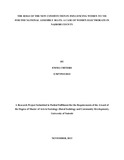| dc.description.abstract | The March 2013 elections in Kenya opened doors to massive political participation by women
for the first time ever. Kenya's constitution promulgamated in 2010 contains a provision that
should radically change political representation for women in this East African country. This
study sought to establish the role of the new constitution in influencing women to vie for the
National Assembly seats in Nairobi County. The study sought to establish ways through which
the two-third gender rule, gender equality in political parties and equal right of opportunities
influence women to vie for the National Assembly seats in Nairobi County.
The target population for this study was all the registered voters in Nairobi County. There are
996,186 registered women voters in Nairobi County which was the study population. The sample
size of this study was 100 respondents. Simple random sampling technique was used to select the
sample size of the respondents. Additionally, purposive sampling was used to select areas
dominated by various ethnic groups. The researcher used stratified sampling to select 100
women in Nairobi County. The study used primary data, which was collected by use of
questionnaires and Key Informant Interviews guides. Quantitative data collected was analyzed
by use descriptive statistics by the help of SPSS (V. 21.0) and presented through frequencies,
percentages, means and standard deviations. This was done by tallying up responses, computing
percentages of variations in response as well as describing and interpreting the data in line with
the study objectives and assumptions. Data was then presented in tables, figures and charts.
The study found most of the women felt that the two-third gender rule was being followed
though a good number of women felt that it was not being followed. Additionally, the study
found that two-third gender rule influenced women to vie for political positions in the last
general election. It was further established that equal treatment and opportunities between
women and men had led to reaping of economic rewards on the basis of merit; improvement of
quality of life; and the electoral and political processes to a moderate extent. Lastly, the study
found that men and women were not treated equally in various political parties in Kenya. It was
also found that in the last election in Kenya, women were not adequately considered in the
manifesto pledges for political parties.
This study therefore recommends that the government should be committed to empowering
women to vie for political positions. Further, the study should be committed to reduction of
inequality between men and women. The study also recommends that the government as well as
other law enforcement bodies should ensure that women and men are treated equally in terms
fundamental human rights and freedom from discrimination. Therefore the study recommends
that law enforcement bodies should ensure that women are well represented in political parties.
In addition public funding of political parties should be linked to the implementation of gender
balance and gender-equality policies in parties. | en_US |

